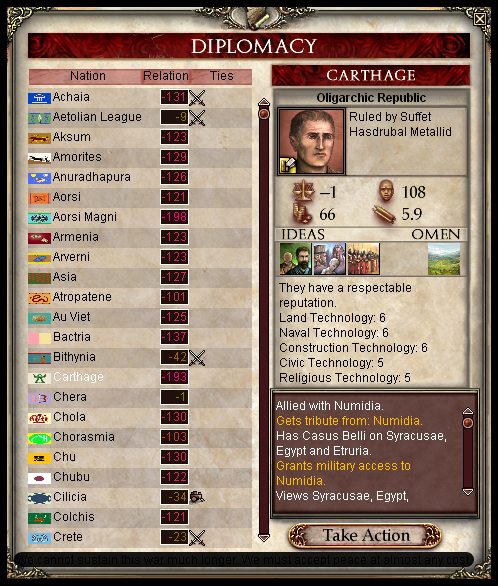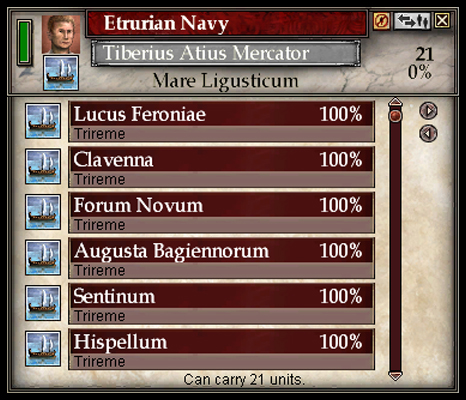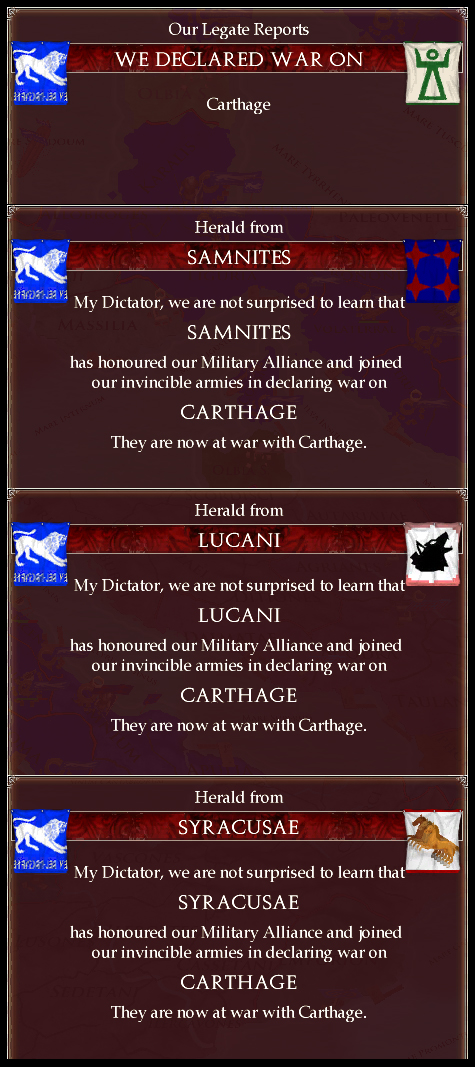PUBLICA INFERIOR: A Republic of Etruria AAR
- Thread starter inertiatic
- Start date
-
We have updated our Community Code of Conduct. Please read through the new rules for the forum that are an integral part of Paradox Interactive’s User Agreement.
You are using an out of date browser. It may not display this or other websites correctly.
You should upgrade or use an alternative browser.
You should upgrade or use an alternative browser.
Chapter 14
Forlorn Revenge
Forlorn Revenge
January, 261 BC.
Almost two years have passed since the end of the civil war. Etruria has begun the long road to recovery, but the damage wrought by Octavius, Balhanno and their benefactors in Carthage has been deeply inflicted. It would take many more years to come before Etruria could return to full health.
Restoration works proceed at great expense across the realm – buildings are reassembled, communities are reconciled and administration is gradually re-established over the dissenting provinces. The Etruscan Dictator, Ulpius Cordus, has taken advantage of these initiatives to resolve an emerging difficulty within his court.
Cordus is now 32 years old, having been in power for 10 long years. He has proven himself a skilled and benevolent ruler, one that has become loved by his people and respected by his subordinates. Nonetheless, he continues to lack a son of his own. Consequently, his younger brother Septimus Ulpius Nasica remains the official heir to the Dictatorship. Septimus was but a child of 14 when he was made heir back in 271 BC - a politically astute manoeuvre by Cordus at the time, given that Septimus was clearly an inferior candidate to Cordus himself and could therefore not be considered a viable challenger for the office. Septimus has since come of age as a man now in his early 20s, but sadly the years have not been kind to him - his lifelong affliction with epilepsy has left him sorely inhibited in all areas of talent. More troubling still are the emerging hints of bitter ambition that Septimus has been increasingly displaying; a jealousy of his older brother stoked in the fact that Cordus had gained absolute power upon the death of their father, while Septimus had received nothing except an empty title. In an effort to reconcile with his brother, the Dictator utilises the post-war restructuring period to promote Septimus as the new Governor of Narbonensis. This was an important responsibility, for the province of Allobroges – which Septimus would now be governing – had only recently rebelled along with Octavius and the republicans. For the time being the promotion seemed to placate Septimus who, despite his failings, immerses himself in the role with enthusiasm.

The Dictator's Council. Septimus Ulpius Nasica is the heir apparent.

The Dictator's younger brother in his new role as Governor of Narbonensis.
With restoration efforts continuing and the full support of his Council behind him, it could be assumed that Cordus had been given cause for relief. But Septimus’s discontent was just one of several concerns that Cordus had had to endure since the end of the civil war. The previous year, 262 BC, had been fraught with tension on the diplomatic stage. The Dictator had still been burning with fury at the duplicity of Carthage, the meddling superpower that had prompted Octavius to ignite his ill-fated civil war. It was a shared animosity between both sides, since the Carthaginians similarly despised the Etruscans for having encroached on Corsica and Sardinia, while fearing them for the solidity and unity that the Dictatorship had brought them. Cordus himself, as a young man of 19, had led the conquest of Karalis in the dying days of the Etruscan republic. Carthage, for it’s part, was under the authority of its newly elected Suffet; the military-minded Hasdrubal, who had recently celebrated the reconquest of Thapsus and Sabratha from the Gindanes. Hasdrubal was a pragmatic leader who had chosen to abandon support for Octavius and the other Etruscan rebels in order to focus on the Gindanes campaign. He was also aggressively expansionist in his dealings; having consolidated his hold over the African mainland, he steadily began to mobilise forces on the Etruscan border throughout 262 BC. An army of 8,000 men was deployed to Sardinia, while Carthaginian fleets made aggressive incursions into the straights between Corsica, Sardinia and the Italian mainland. Carthage was in a strong position, having finally secured its hold over Africa while building up a huge pool of manpower as well as a revitalised and enlarged navy.

Carthaginian forces deployed on the Etruscan border, poised for invasion.

The Republic of Carthage and it's incumbent Suffet, Hasdrubal. Note the huge manpower reserves - over 100,000 men.
It was an anxious time for the Etruscans – the threat of invasion was high and there was a great deal of fear amongst its citizens. In stark contrast to Carthage, the Etruscan manpower reserves were the greatest concern of all. Cordus himself had come to realise that the wilder regions of the north, where the redoubtable Legio Etruria had been deployed throughout the civil war, simply lacked the infrastructure and support needed to supply such a large body of troops during prolonged campaigns. Disease, starvation and even desertion withered the ranks when operating anywhere north of Bononia. These losses became unbearable when added to the casualties that fell in the perpetual skirmishes with barbarian raiders that afflicted the region. Manpower reserves were therefore dangerously low and the army was in no condition for another protracted conflict.

Etruscan manpower report, 262 BC. Reserves have flatlined during recent conflicts.
As a consequence, the Dictator had been forced to postpone his grand campaign in Gaul while his forces licked their wounds and guarded against the threat of invasion from Carthage. One silver lining was the abundance of wealth - Etruria’s largely slave-based economy, fuelled by the thousands of barbarian captives led back in chains from the north each year, provided a large and stable national income. With the onset of manpower shortages, Cordus began to invest great sums of the state’s wealth upon the Navy, which at a total of 200 ships was already powerful by the standards of the region. Nevertheless, the Dictator was determined for the Navy to become a match for that of Carthage, ordering the immediate construction of 100 additional vessels.
The climate of fear continued to hang over Etruria until December, at which point the Carthaginian forces suddenly and abruptly withdrew. An atmosphere of cautious relief and celebration took hold across the realm as it seemed that Etruria had been spared the ravages of invasion. The Dictator and his Council remained suspicious, and continued to pore over intelligence reports in an effort to establish Hasdrubal’s intentions. The reasons would then become apparent within the early weeks of the new year.
-------------------------------------------------------------------------------------------------------------------------------------------------------------------------------------------------------
JANUARY 261 BC – THE LUSITANI RESISTANCE
In early January, an Etruscan merchant operating in Gaul returns home with fateful news. A collection of Gallic tribes – namely, the Sequani and the Lemovices – have made announcements of mutual support for their tribal allies in Spain, who had sent out desperate pleas for aid in the face of overwhelming peril; mighty Carthage has declared war upon them.

The broad peninsula of Spain holds many social and political similarities to it’s neighbour, Gaul. Like Gaul, Spain is divided into a patchwork of more centralised tribal regions surrounded by a wilder barbarian lands. However, whereas the more cultivated areas of Gaul are divided between a variety of smaller tribal units such as the Sequani and the Lemovices, in contrast Spain has its cultivated areas dominated by one single tribe – the Lusitani.
The Lusitani are a Celtiberian tribal nation that originated on the western coast of the Spanish peninsula. Around 40 years ago they had succeeded in conquering their neighbours, the Vaccaei and the Cantabri, to form a new Lusitani-dominated exclave on the north coast. Recent years, however, have seen the ominous advance of Carthage in southern Spain. In a similar fashion to the Etruscans who had expanded their colonies into Gaul, Carthage has founded settlements deeper and deeper into the Spanish interior – by now it controlled around a quarter of all Spain. Recent years have seen tension mounting as Carthaginian settlements have pushed right up against the Lusitani’s southern border, leading to disputes and localised violence.
As the new year 261 BC comes around, Hasdrubal of Carthage makes the momentous decision to forgo the invasion of Etruria and instead diverts his forces to western Spain. His intelligence has correctly identified that the Etruscans are weakened following Octavius’s Civil War – however, Hasdrubal knows that the Etruscans retain a powerful standing army and navy, as well as strategically well-placed allies in the Samnite Republic and the Kingdom of Syracuse. Hasdrubal surmises that when placed on the defensive the Etruscans would be difficult to defeat, but in their weakened state they would be unable to launch offensives of their own. Thus, Carthage could afford to mount a major campaign in Spain without interference from elsewhere. With Spain secured for Carthage, they would possess overwhelming lands and resources with which to finally secure their dominance of the western Mediterranean.
Back in Etruria, Dictator Cordus proceeds to call an emergency assembly of his Council to discuss the troubling news. All those present were well aware of the Dictator’s wrath towards the Carthaginians, while also understanding the dangers presented by an expanded Carthage with Spain under its grasp. But what could be done? Limited suggestions were hesitantly put forward; dispatch funds to the Lusitani to support their war effort…bide our time and consolidate while Carthage exhausts itself in Spain before launching a counter offensive…sound out dissidents in Africa and support them in revolution as Balhanno had done with Octavius. But Cordus would heed none of these half-hearted proposals. He was determined beyond all reason to enact revenge upon Carthage – as a consequence, his plan was as bold as it was perilous. Etruria, he announced, would raise its weary arms once again and muster its courage for war.
The Council made its objections known in no uncertain terms. Carthage must certainly be punished for it’s transgressions but now was not the time. The army’s barracks were empty – there were no reserves undergoing training, for there were simply not enough men. It would take but a single victory over the Legio Etruria for the realm’s forces to be wiped out for good, leaving them defenceless. In contrast, all available intelligence suggested that Carthage had been marshalling its resources for some time and possessed an overwhelming force of arms. Hasdrubal had played his hand perfectly - Etruria had been crippled and was hopelessly unprepared for the conflict.
The Dictator was adamant, however, and could not be placated. He well understood his Councillor’s objections that the realm was in no fit state for protracted conflict; therefore, he announced, this would need to be a war fought with acumen, not with force of arms. His plan was threefold.
First, he would amalgamate his two auxiliary forces as a combined Auxila Etruria, 12,000 men total, to be deployed on Sardinia under the command of the proven General, Decimus Vitallius Vitalis. Decimus had performed admirably in the Civil War, personally defeating Octavius’s forces and winning a number of important sieges. Once Carthage was committed in Spain, General Decimus would lead the Auxilia north to Olbia, with the objective of capturing the province while taking as few casualties as possible. He was then to garrison the island against any Carthaginian counterattack. Should this part of the plan succeed, Carthage would be stung in the east while giving Etruria the potential to conquer Sardinia for good. Cordus intended this to be the only land campaign of the war, hoping to allow Etruscan manpower reserves to continue to recover while the other parts of his strategy unfolded.

The newly amalgamated Auxilia Etruria; 12,000 men deployed at Karalis under the command of General Decimus.
The second objective was an offensive on Sicily, where Carthage yet retained the key central city of Agrigentum. Ideally this attack would be led by Syracuse, who could then claim the city at the end of the war and unify the island under their rule, providing Etruria with a strong and solidified ally on their southern flank. Cordus hoped that the Republic of Samnium would also support this venture. To further unite Italy against Carthage in the south, the Dictator made the surprising announcement that he would even stoop to re-allying with the Lucani, who had cowardly abandoned him in the recent conflict, so that their forces could be added to the campaign. The Lucani, for their part, had become fearful of the Samnites following their conquest of Campania and Heraclea, and were only too happy to be allowed back into the fold.

The final and most important part of the plan was also by far the most ambitious. Cordus resolved to place his faith – and ultimately the entire fortunes for the war effort - in his expanding Navy, which he intended to bear the brunt of the fighting. The Dictator felt that if the fleet could take the fight to Carthage out on the open water, then the mainland need never be threatened – the army could remain safe and well-supplied while Carthage would be prevented from landing reinforcements or initiating an invasion of it’s own. Clearly, the benefits of such a strategy succeeding were huge, given Etruria’s manpower limitations. However, this was based on the dangerous assumption that the Etruscan Navy could stand up to its Carthaginian counterpart. After all, Carthage had moulded its entire empire on the back of its formidable power at sea. If Carthage were to defeat the Etruscan Navy then the whole length of the Italian mainland would be laid open to invasion, not to mention the islands of Corsica and Sardinia which would be completely cut off. Neverthless, the Dictator was resolute and the fleet began to muster at Volaterrae – an initial 210 ships, with more under construction. This was estimated to be around only half of what Carthage could deploy at sea. But Cordus remained confident of victory – with Carthage committed to operations in western Spain, it’s fleet would likely be divided, presenting the Etruscans with the opportunity of overwhelming a fraction of the Carthaginian naval forces in a more localised theatre of operations, perhaps near Corsica and Sardinia. Again, the risks were severe but the prospect of inflicting a blow against Carthage was infinitely too tempting for Cordus to resist.
Command of the fleet was given to another of the Dictator’s Legates, one Tiberius Atius Mercator. Admiral Tiberius carried a cognomen in honour of the great Mercator Audax, but was in fact a cousin of Atius Tacitus, the General who had commanded the Auxilia Fulvii during the recent civil war.

The Etruscan Navy under the command of Admiral Tiberius.
By the end of February, with his forces arrayed before him, the Dictator could wait no longer and gleefully dispatched the declaration of war against Carthage. The Etruscans were immediately joined by each of their allies – Syracuse, the Samnites and even the Lucani.
At long last, Cordus had gained his chance for revenge. The outcome was anything but certain.
The Third Punic War had begun.

Im loving this. Its a shame it takes so long for these to come out
Yeah, well lets just hope there's not another 3-4 year delay this time!
- 1
I have an end point in mind, set around 20-25 years from now (i.e. somewhere around 240 BC). All the chapters from this point until the end of the AAR are based on gameplay that has already happened - I'm just typing it up based on the screenshots and notes that I've already taken. I'm guessing this will translate into somewhere around 6-8 chapters, assuming it doesn't get too boring by then!
I missed that delay thankfully. Loved the latest chapterYeah, well lets just hope there's not another 3-4 year delay this time!
- 1
Oh it's not boring, I was just curious.I have an end point in mind, set around 20-25 years from now (i.e. somewhere around 240 BC). All the chapters from this point until the end of the AAR are based on gameplay that has already happened - I'm just typing it up based on the screenshots and notes that I've already taken. I'm guessing this will translate into somewhere around 6-8 chapters, assuming it doesn't get too boring by then!
- 1

